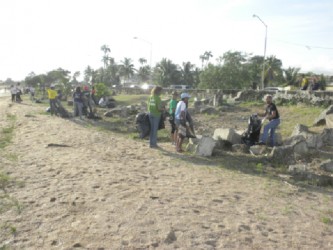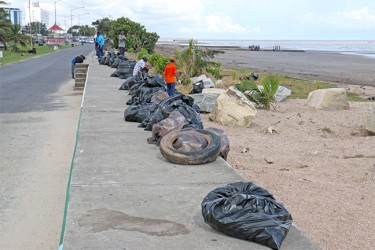Guyana joined the rest of the world in observance of International Coastal Clean-Up (ICC) Day yesterday, when volunteers gathered to clean up garbage along the seawall.
The clean-up campaign was opened to schools, non-governmental organisations (NGOs), religious, community and youth groups as well as interested persons. It began at 6:30am and was conducted along the seawalls from Pegasus Hotel to Camp Street.
The volunteers were also joined by Minister of Natural Resources and the Environment Robert Persaud along with Prime Minister Samuel Hinds.
In a message released on the day’s occasion, Minister Persaud noted that marine litter is a major issue around theworld, particularly in Guyana. These debris, he said, are not necessarily dumped in the ocean but further inland before subsequently washing down into the oceans.

He further noted that marine litter leads to a number of issues, including the compromised health of humans and wildlife as well as complicated shipping and transportation caused by navigation hazards.
Here in Guyana, plastic and Styrofoam products are found to be amongst the most common form of trash found, Persaud said.
“No doubt much of this plastic trash was strewn or tossed along the seawalls by persons who were most likely at the seawalls on an outing with friends and family,” the minister said. He continued, “It is rather ironic that we visit the seawalls to enjoy the ambiance and fresh air yet without any thought we toss trash around, never stopping to think of how our actions will affect our enjoyment of these in the future.”
The minister further encouraged all Guyanese to join in combatting coastal pollution and pointed out that debris seen on dirty beaches and floating on the ocean’s surface is “just the tip of the iceberg.”
“Much more lies unseen beneath the surface and far away on the open water – but that doesn’t make it any less important,” he emphasised. “This is why we need to heed the call to take bold action and work to stop the flow of trash at the source.”
According to Persaud, every citizen can play a part in ensuring that waterways and oceans are trash-free by doing simple actions such as disposing waste in bins and at legally designated locations. He also believed that there is a need for the erasure of the habit of tossing food and drink bottles on the road and along and over the seawalls.
The International Coastal Cleanup activities were coordinated by the Environmental Protection Agency (EPA). The body collaborated with other partners to assemble volunteers to participate in the exercise.
The cleanup activities took part not only in Georgetown but in regions 2, 3, 6, and 10 as well.
Yesterday’s activities are not the only ones set at reducing litter in Guyana; in 2012 the Pick-it-up Guyana (PIUG) initiative was launched and, in early 2014, the government of Guyana launched a billion dollar Clean-Up my Country Programme.

The observance is held on the 3rd Saturday of September each year and aims to heighten public awareness of the causes of litter and debris. It also seeks to make a positive change and to promote water pollution prevention efforts worldwide.
On ICC Day last year, nearly 650,000 volunteers collected 12.3 million pounds of trash from coastal beaches and inland waterways in 92 countries and locations.





